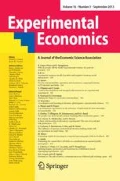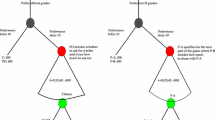Abstract
This paper contributes to the ongoing methodological debate on context-free versus in-context presentation of experimental tasks. We report an experiment using the paradigm of a bribery experiment. In one condition, the task is presented in a typical bribery context, the other one uses abstract wording. Though the underlying context is heavily loaded with negative ethical preconceptions, we do not find significant differences with our 18 independent observations per treatment. We conjecture that the experimental design transmits the essential features of a bribery situation already with neutral framing, such that the presentation does not add substantially to subjects’ interpretation of the task.
Similar content being viewed by others
References
Abbink, K. (2004). Staff rotation as an anti-corruption policy: an experimental study. European Journal of Political Economy, 20, 887–906.
Abbink, K. (2005). Laboratory Experiments on Corruption. Forthcoming in Susan Rose-Ackerman (ed.). The Handbook of Corruption. Edward Elgar Publishers.
Abbink, K., Irlenbusch, B., & Renner, E. (2002). An Experimental Bribery Game. Journal of Law, Economics, & Organization, 18, 428–454.
Abbink, K., & Sadrieh, A. (1995). RatImage—Research Assistance Toolbox for Computer-Aided Human Behavior Experiments. Sonderforschungsbereich 303, Discussion Paper B-325, University of Bonn.
Albers, W., & Harstad, R. (1991). A Framing Effect in a Market Game. In R. Selten (Ed.), Game equilibrium models II, methods, Morals, and Markets (pp. 308–331). Berlin, Heidelberg, New York: Springer.
Alm, J., McLelland, G. H., & Schulze, W. D. (1992). Why do people pay taxes? Journal of Public Economics, 48, 21–38.
Andreoni, J. (1995). Warm-Glow versus Cold-Prickle. The Effects of Positive and Negative Framing on Cooperation in Experiments. Quarterly Journal of Economics, 110, 1–21.
Baldry, J. C. (1986). Tax Evasion Is Not a Gamble—A Report on Two Experiments. Economics Letters, 22, 333–335.
Berg, J., Dickhaut, J., & McCabe, K. (1995). Trust, Reciprocity and Social History. Games and Economic Behavior, 10, 122–142.
Blount, S., & Larrick, R. P. (2000). Framing the Game. Examining Frame Choice in Bargaining. Organizational Behavior and Human Decision Processes, 81, 43–71.
Burnham, T., McCabe, K., & Smith, V. L. (2000). Friend-or Foe: Intentionality Priming in an Extensive Form Trust Game. Journal of Economic Behavior and Organization, 43, 57–74.
Chatterjee, S., Heath, T. B., Milberg, S. J., & France, K. R. (2000). The Differential Processing of Price in Gains and Losses. The Effects of Frame and Need for Cognition. Journal of Behavioral Decision Making, 13, 61–75.
Cookson, S. (2000). Framing Effects in Public Goods Experiments. Experimental Economics, 3, 55–79.
Cooper, D. J., Kagel, J. H., Lo, W., & Gu, Q. L. (1999). Gaming against Managers in Incentive Systems. Experimental Results with Chinese Students and Chinese Managers. American Economic Review, 89, 781–804.
Davis, D. D., & Holt, Ch. A. (1993). Experimental economics. Princeton, N.J.: Princeton University Press.
Druckman, J. N. (2001). Evaluating Framing Effects. Journal of Economic Psychology, 22, 91–101.
Dufwenberg, M., & Gneezy, U. (2000). Measuring Beliefs in an Experimental Wallet Game. Games and Economic Behavior, 30, 163–182.
Eckel, C. C., & Grossmann, Ph. J. (1996). Altruism in Anonymous Dictator Games. Games and Economic Behavior, 16, 181–191.
Elliott, C. S., & Hayward, D. M. (1998). The Expanding Definition of Framing and Its Particular Impact on Economic Experimentation. Journal of Socio Economics, 27, 229–243.
Elliott, C. S., Hayward, D. M., & Canon, S. (1998). Institutional Framing. Some Experimental Evidence. Journal of Economic Behavior and Organization, 35, 455–464.
Fahr, R., & Irlenbusch, B. (2000). Fairness as a Constraint on Trust and Reciprocity. Economics Letters, 66, 275–282.
Fehr, E., Kirchsteiger, G., & Riedl, A. (1993). Does Fairness Prevent Market Clearing? An Experimental Investigation. Quarterly Journal of Economics, 108, 437–459.
Fehr, E., Gächter, S., & Kirchsteiger, G. (1997). Reciprocity as a Contract Enforcement Device. Econometria, 65, 833–860.
Fehr, E., & Tyran, J.-T. (2001). Does Money Illusion Matter? American Economic Review, 91, 1239–1262.
Fehr, E., & Zych, P. K. (1998). Do Addicts Behave Rationally? Scandinavian Journal of Economics, 100, 643–662.
Frank, B., & Schulze, G. G. (2000). Does Economics Make Citizens Corrupt? Journal of Economic Behavior and Organization, 43, 101–113.
Gächter, S., & Riedl, A. (2005). Moral Property Rights in Bargaining. Management Science, 51, 249–263.
Gigerenzer, G. (1996). Rationality. Why Social Context Matters. In P. A. Baltes & U. M. Staudinger (Eds.), Interactive minds. life-span perspectices on the focial foundations of Cognition (pp. 319–346). Cambridge: Cambridge University Press
Güth, W., Ivanova-Stenzel, R., & Tjotta, S. (2004). Please Marry Me!—An Experimental Study of Risking a Joint Venture. Metroeconomica, 55, 1–21.
Hoffman, E., McCabe, K., & Smith, V. L. (2000). The Impact of Exchange Context on the Activation of Equity in Ultimatum Games. Experimental Economics, 3, 5–9.
Holt, Ch. A. (1995). Industrial Organization. A Survey of Laboratory Research. In J. H. Kagel, & A. E. Roth, (Eds.), The handbook of experimental economics (pp. 349–443). Princeton, N.J.: Princeton University Press.
Irlenbusch, B., & Sutter, M. (2003). An Experimental Analysis of Voting in the Stability and Growth Pact in the European Monetary Union. University of Innsbruck, mimeo.
Johannesson, M., & Johansson, P. O. (1997). Saving Lives in the Present versus Saving Lives in the Future-Is There a Framing Effect? Journal of Risk and Uncertainty, 15, 167–176.
Kachelmeier, St. J., & Shehata, M. (1997). Internal Auditing and Voluntary Cooperation in Firms. A Cross-Cultural Experiment. Accounting Review, 72, 407–431.
Kahneman, D., & Tversky, A. (1979). Prospect Theory. An Analysis of Decision Making under Risk. Econometrica, 47, 263–291.
Keser, C., Rullière, J.-L., & Villeval, M.-C. (2004). Le paradoxe de l’adhésion syndicale, une approche en termes de bien publics. The paradox of union membership. Economie et prèvision, 164-165(3-4), 81–92.
Klitgaard, Robert. (1988). Controlling Corruption. University of California Press.
Kühberger, A., Schulte-Mecklenbeck, M., & Perner, J. (1999). The Effects of Framing, Reflection, Probability, and Payoff on Risk Preference in Choice Tasks. Organizational Behavior and Human Decision Processes, 78, 204–231.
Levin, I. P., Schneider, S. L., & Gaeth, G. J. (1998). All Frames Are Not Created Equal. A Typology and Critical Analysis of Framing Effects. Organizational Behavior and Human Decision Processes, 76, 149–188.
Levin, I. P., Gaeth, G. J., Schreiber, J., & Lauriola, M. (2002). A New Look on Framing Effects. Distribution of Effect Sizes, Individual Differences, and Independence of Types of Effects. Organizational Behavior and Human Decision Processes, 88, 411–429.
Liberman, V., Samuels, St., & Ross, L. (2004). The Name of the Game. Predictive Power of Reputations vs. Situational Labels in Determining Prisoner’s Dilemma Game Moves. Personality and Social Psychology Bulletin, 30, 1175–1185.
Loewenstein, G. (1999). Experimental Economics from the Vantage Point of Behavioural Economics. Economic Journal, 109, F25–F34.
Loomes, G. (1999). Some Lessons from Past Experiments and Some Challenges for the Future. Economic Journal, 109, F35–F45.
Neale, M. A., & Bazerman, M. H. (1985). The Effects of Framing and Negotiation Overconfidence on Bargaining Behaviors and Outcomes. Academy of Management Journal, 28, 34–49.
Offerman, Th., Sonnemans, J., & Schram, A. (1996). Value Orientations, Expectations, and Voluntary Contributions in Public Goods. Economic Journal, 106, 817–845.
Ortmann, A., & Gigerenzer, G. (1997). Reasoning in Economics and Psychology. Why Social Context Matters. Journal of Institutional and Theoretical Economics (JITE), 153, 700–710.
Ortmann, A., Fitzgerald, J., & Boeing, C. (2000). Trust, Reciprocity, and Social History. A Reexamination. Experimental Economics, 3, 81–100.
Park, E.-S. (2000). Warm-Glow versus Cold-Prickle. A Further Experimental Study of Framing Effects on Free-Riding. Journal of Economic Behavior and Organization, 43, 405–421.
Potters, J., & van Winden, F. (2000). Professionals and Students in a Lobbying Experiment. Professional Rules of Conduct and Subject Surrogacy. Journal of Economic Behavior and Organization, 43, 499–522.
Pruitt, D. G. (1967). Reward Structure of Cooperation. The Decomposed Prisoners’ Dilemma Game. Journal of Personality and Social Psychology, 7, 21–27.
Rabin, M. (1998). Psychology and Economics. Journal of Economic Literature, 36, 11–46.
Rose-Ackerman, S. (1985). Corruption—A Study in Political Economy. Academic Press.
Ross, L., & Ward, A. (1996). Naive Realism in Everyday Life. Implications for Social Conflict and Misunderstanding. In E. S. Reed, E. Turiel, & T. Brown, (Eds.), Values and knowledge (pp. 103–135). Mahwah, N.J.: Lawrence Erlbaum Associates.
Schotter, A., Weigelt, K., & Wilson, Ch. (1994). A Laboratory Investigation of Multiperson Rationality and Presentation Effects. Games and Economic Behavior, 445–468.
Selten, R., & Berg, C. C. (1970). Drei experimentelle Oligopolserien mit kontinuierlichem Zeitverlauf. In H. Sauermann (Ed.), Beiträge zur experimentellen Wirtschaftsforschung, vol. 2 (pp. 162–221). Tübingen: J.C.B. Mohr.
Shleifer, A., & Vishny, R. W. (1993). Corruption. Quarterly Journal of Economics, 108, 599–617.
Sonnemans, J., Schram, A., & Offerman, Th. (1998). Public Good Provision and Public Bad Prevention. The Effect of Framing. Journal of Economic Behavior and Organization, 34, 143–161.
Traub, Stefan. (1999). Framing Effects in Taxation. An Empirical Study Using the German income tax schedule. Physica: Heidelberg.
Tversky, A., & Kahneman, D. (1981). The Framing of Decisions and the Psychology of Choice. Science, 211, 453–458.
Weber, M., Keppe, H.-J., & Meyer-Delius, G. (2000). The Impact of Endowment Framing on Market Prices—An Experimental Analysis. Journal of Economic Behavior and Organization, 41, 159–176.
Willinger, M., & Ziegelmeyer, A. (1999). Framing and Cooperation in Public Good Games. An Experiment with an Interior Solution. Economics Letters, 65, 323–328.
Author information
Authors and Affiliations
Corresponding author
Additional information
JEL Classification C91 · D62 · D72 · D73 · K42
Rights and permissions
About this article
Cite this article
Abbink, K., Hennig-Schmidt, H. Neutral versus loaded instructions in a bribery experiment. Exp Econ 9, 103–121 (2006). https://doi.org/10.1007/s10683-006-5385-z
Received:
Revised:
Accepted:
Issue Date:
DOI: https://doi.org/10.1007/s10683-006-5385-z




